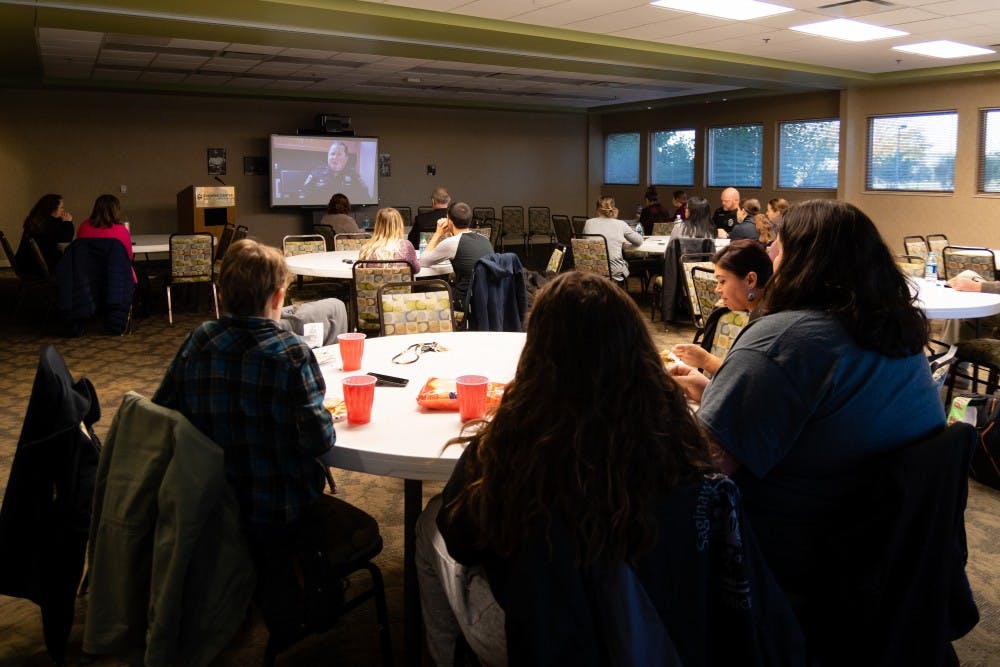Showing of Bay City film conveys reality of opioid epidemic in Mid-Michigan
Families Against Narcotics (FAN) of Isabella County is working to fight the opioid epidemic that according to the organization, within the last 10 years, has become more pervasive in the Central Michigan area.
With the help from members of the Saginaw Chippewa Tribe and Central Michigan University, FAN Isabella County hosted an event on Oct. 18 that helped to raise awareness of the devastation and heartache created by heroin and other narcotics.
Before a panel discussion, attendees watched the film “Stigmatic: Our Opioid Crisis" at the Ziibiwing Center of Anishinabe Culture and Lifeways, located at 6650 E. Broadway Road.
Filmed in Bay City, Michigan, “Stigmatic” was nominated for a Michigan film festival award. The documentary shows a composition of interviews with those impacted by opioids including law enforcement, medical professionals and people in recovery.
"It's a bird's eye view of the (opioid) crisis," said Deb Schafer, president of FAN Isabella County.
The film hits close to home for the Mid-Michigan area because it was filmed only an hour away from Mount Pleasant, said Sarah Garchow, FAN team member.
Tribal Police Officer Joe Maxey said the opioid crisis is prevalent in Mount Pleasant.
"You see it going on in this country, and we are part of this country," he said.
In the film, several people shared their stories of how their lives have been directly affected by addiction. These people included Kristy, who claimed every bone in her 90 pound body showed through her skin due to an addiction and Pastor Steve, whose son Kevin died due to a heroin overdose.
Another woman named Emily had an ex-boyfriend who first introduced her to heroin while they were dating. She received treatment and relapsed several times until her addiction got so severe that it ruined her cardiovascular system.
"My body was ready to give up before I was," Emily said in the film.
Emily's doctor said she would no longer be able to exercise or even climb a flight of stairs. The scar that now runs down the center of her chest from open-heart surgery is a bitter reminder of her former struggle with addiction.
The film also expressed that in order to solve the opioid epidemic the stigma that addiction is a moral problem rather than an illness, must die.
"If a friend has diabetes and continues to eat Cops and Doughnuts every day after being sent to the hospital three times, I am going to continue to try to help them," Schafer said. "Why is addiction not treated like every other health problem?" she said.
In 2017, 17 people in Mount Pleasant died of an overdose, Schafer said.
Maxey said Michigan's Good Samaritan Law protects those who assist someone experiencing an overdose from liability of consequences. When someone is faced by harm or potential death because of an overdose, their associates should call health authorities.
Abuse counselor Bob Storrer said people should get rid of the idea that you can't help someone if they don't want help.
"Treat 'em once, treat 'em twice, treat 'em three times, treat 'em as many times as is needed," Storrer said.
Storrer said during the panel discussion that a lot of young people and athletes get addicted to painkillers after they are prescribed to them. After they cannot refill their prescription they turn to narcotics like heroin, which is "available in unlimited supply."
Parents say "not my child" or "my child would never" all the time, he said.
"Before I became an addict the typical addict was a dirty, toothless prostitute with lots of tattoos," a 67-yer-old member of narcotics anonymous said in the film. "When I went to my first narcotics anonymous meeting for treatment, the so-called addicts were clean, laughing and smiling."
The idea for FAN resulted from the overdose of two Fraser, Michigan teenage boys in 2007. The organization started with a small group of grieving families, law enforcement, religious leaders and concerned citizens gathered in the basement of a Methodist church.
"(The opioid epidemic) has altered the course of future generations,” the Isabella County FAN webpage says. “Every overdose and death -- the impact is devastating.”
Now with 34 monthly support group meetings across the state and 21 local chapters, FAN represents hope to hundreds of families.
The non-profit organization continues to seek change in the face of addiction by dispelling the stigma of addiction, offering support and educating the community of the dangers of prescription drug abuse.
FAN offers hope in recovery through a variety of resources and a national 24/7 hotline: 800-622-HELP (4357).
Local FAN meetings are held at 7 p.m. the first Thursday of every month at Support Tribal’s Operation Senior Room and 7 p.m. the third Thursday of every month at the Ziibiwing Center. All are welcome to come.








